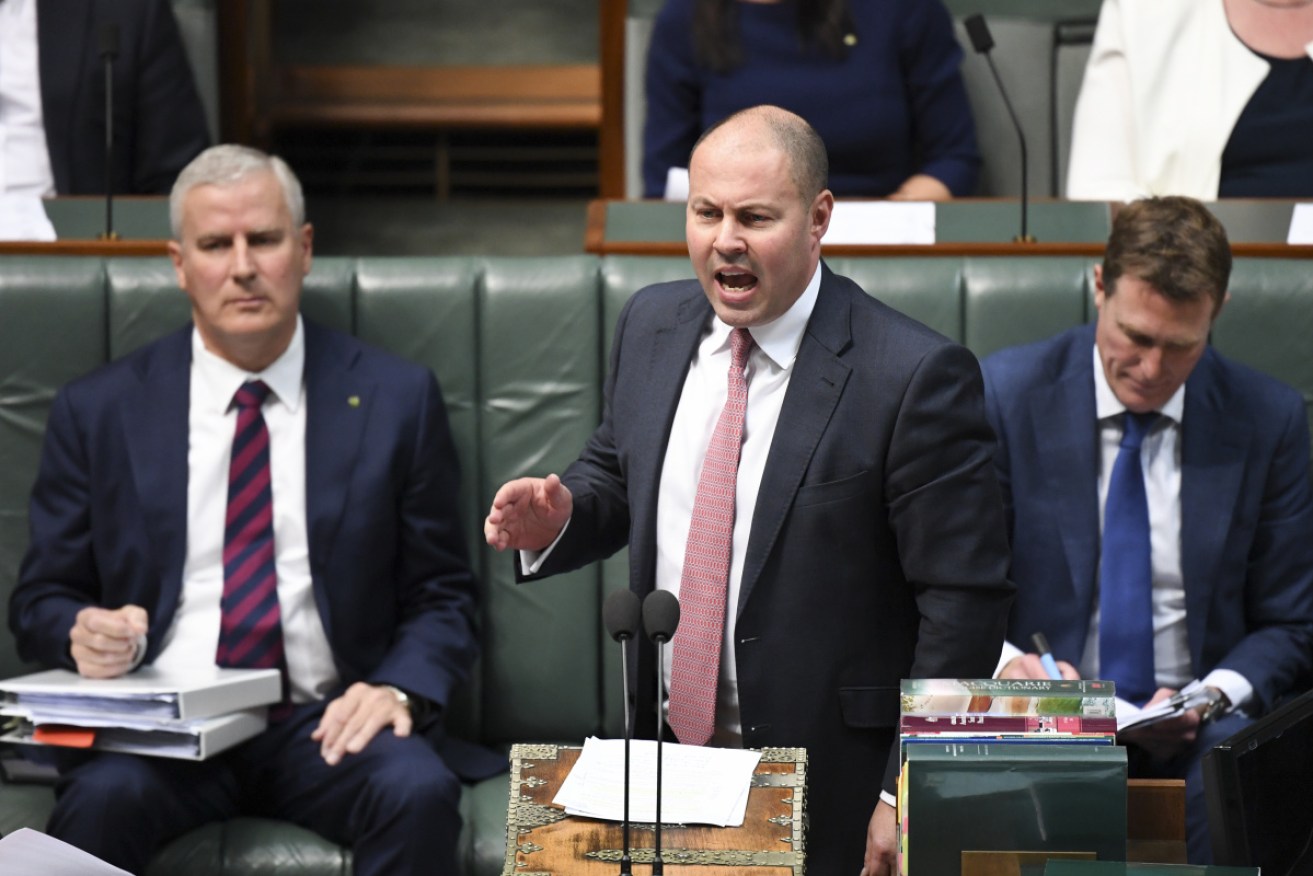Josh Frydenberg’s home loan inquiry is a stunt – let’s hope the ACCC surprises


“Look over there! An inquiry into greedy banks!”
Josh Frydenberg’s “banks not passing on interest rate cuts” inquiry has proven an immediately successful stunt.
Consumer confidence has fallen, retail is in recession, the promised tax cut bounce hasn’t really happened and unemployment is rising but “Look over there! An inquiry into greedy banks!”
Nearly all the media fell for it, explicitly buying the line that borrowers were indeed being short-changed by banks, somewhat begging the question.
They were assisted in that folly by inanely simplistic “Treasury numbers” as faithfully reported, for example, by The Australian Financial Review: “Their refusal to pass the rate on in full, as well as delays in passing on the reductions the banks did grant, will see the big four pocket $569 million in revenue between them, according to Treasury numbers released by Mr Frydenberg.”
Nothing like dropping a big “revenue” figure to distract from what the profitability impact might be. It’s obviously profitability that counts when alleging banks are profiteering, not revenue.
As previously explained in this space, only an ignorant or misleading politician would want the public to think the banks are able to automatically pass on Reserve Bank changes to its cash rate, that the cash rate automatically determines the cost of funds for banks.
And politicians from both sides rather automatically do so. Cue Labor’s shadow Treasurer, Jim Chalmers, immediately saying “me too”.
It is now up to the Australian Competition and Consumer Commission to make something economically worthwhile out of this political stunt.
That is possible. There is more to the inquiry’s terms of reference than just the headline rate cut issue.
But those terms don’t make it easy, as they are a little strangely restrictive in some aspects.
Specifically, the ACCC is directed to consider what has happened to rates since January 1 this year.
If the ACCC was silly enough to accept 2019 as its limit, it would rule out extensive work already done by the Reserve Bank over several years on what really goes on with interest rates. Looking back a little further provides important perspective and understanding.
Treasurer Frydenberg’s reference also expressly forbids the inquiry extending into the conduct of mortgage brokers, saying that’s covered by other inquiries.
Maybe. But if you seriously wanted to know about competition in the mortgage market, how the Big Four maintain their dominance, restraints on switching lenders and consumer behaviour, you’d probably want to look rather closely at the source of 60 per cent of mortgages.
No, Josh, you can’t have a worthwhile home loan inquiry without getting into the conduct of the majority of the loan originations.
If ACCC’s Rod Sims is any good, he’ll find a way around the “don’t go there” order.
The Treasurer directs the ACCC not to examine the supply of goods and services “by a particular person or persons”.
That sounds like Mr Frydenberg doesn’t want anything like the “perp walk” that the banking royal commission at times became – it’s nothing personal this time, banks, it’s the Big Four brands.
This inquiry is pitched at a higher, systemic level of how banking works rather than seeking specific examples of misdeeds as a warning to others. It should be what Hayne wasn’t.
Most of what the inquiry is directed to chase is not difficult.
Anyone who has been keeping up with bank annual reports and RBA research will know about the difference in pricing for new and existing loans, the difference between advertised reference rates and what is actually charged, and the movement of net interest margins.
It is curious the politicians are suspicious of banks wanting to sell their products for the best price the market will bear, rather than at their lowest possible price.
Any business selling anything, any worker selling his or her labour, anyone selling their car privately, will try to sell for more than their rock-bottom price if they can. Banks are no different.
Where interesting new work could be done by the ACCC is the direction to inquire into “consumer behaviour, including consumer decision-making, biases and choices”.
Why don’t we switch banks when we complain about them so much?
Why don’t we shop around for the cheapest loan, potentially saving scores of thousands of dollars?
Do people know the non-Big Four banks are just as safe as the Big Four? Is there sufficient information available on what rates are really charged?
The impediments to switching lenders have been reduced by both Labor and Coalition governments. This inquiry has been directed to look further into any remaining hurdles, but the biggest one now seems to be the individual customer.
Mr Frydenberg is calling it the “loyalty tax” that customers pay for not shopping around. It seems to be a recent discovery for him.
I’ve been calling it the “lazy tax” for many years – there’s nothing new about it.
A fault of the banking royal commission was that it was a lawyers’ picnic.
The lawyers were very good, but they were still lawyers and therefore tended to look at matters through the prism of law, rather than with the broader appreciation of the ecosystem that a good economist is meant to provide.
There is one particular law that lawyers are often blind to – the Law of Unintended Consequences.
Hopefully, the broader skills the ACCC will bring to bear on this inquiry will keep that law in mind.
And, hopefully, the ACCC will work around Mr Frydenberg’s restrictions to deliver a report with fresh insight and understanding of our mortgage market.
Otherwise, it could end the way it has started – as a political stunt.








